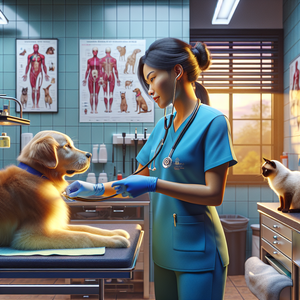
A Comprehensive Overview of Relief Veterinarian Careers: Navigating Roles, Requirements, and Opportunities
The veterinary field is undergoing significant transformation, and the demand for relief veterinarians is experiencing notable growth. This shift underscores the critical need for adaptable staffing solutions in veterinary care. Relief veterinarians play a vital role by offering temporary assistance to clinics and animal hospitals, ensuring that pets continue to receive seamless care during staff shortages or busy periods. This career path provides veterinarians with the freedom to work flexibly while gaining diverse experiences that can further their professional development.
Job Summaries:
Relief Veterinarian:
- Relief veterinarians are indispensable during peak periods or staff absences.
- They perform examinations, diagnosing health issues, administering treatments, and conducting surgeries.
- A Doctor of Veterinary Medicine (DVM) degree and state licensure are essential.
- Strong clinical and communication skills are important.
- This role enriches veterinarians' experiences across different practices.
- It cultivates their adaptability.
Veterinary Recruiter:
- Veterinary recruiters specialize in matching qualified veterinarians with relief positions.
- They oversee the recruitment process, from candidate sourcing to interviews.
- A background in veterinary medicine or human resources is crucial for success in this role.
- Excellent networking abilities are important for success in this role.
- This role significantly enhances clinics' access to skilled relief veterinarians.
Account Manager at a Veterinary Staffing Agency:
- Account managers are responsible for nurturing relationships with veterinary clinics and delivering effective staffing solutions.
- They comprehend clinics' needs and market staffing services accordingly.
- Strong organizational skills and experience in sales or account management are necessary, as they ensure the operational continuity of veterinary practices.
Veterinary Technician:
- Veterinary technicians support veterinarians in clinical settings by performing essential tasks.
- Essential tasks include administering medications and conducting lab tests.
- An associate's degree in veterinary technology and relevant certification are required.
- Their assistance is vital during relief situations.
- Veterinarians can concentrate on diagnostics and treatment with their support.
Veterinary Practice Manager:
- Veterinary practice managers oversee the administrative functions of clinics.
- Ensuring smooth operations, staff management, and financial oversight.
- Typically, a bachelor's degree in business administration is required.
- This role creates a supportive environment for relief veterinarians.
- Alleviating administrative burdens.
Emergency Veterinarian:
- Emergency veterinarians provide critical care to animals in urgent need.
- They manage trauma cases and perform emergency surgeries.
- This position necessitates a DVM degree with specialized training in emergency medicine.
- This position works in conjunction with relief veterinarians to handle urgent cases effectively.
Veterinary Consultant:
- Veterinary consultants advise clinics on operational improvements and quality enhancement strategies.
- Generally holding a DVM degree and extensive experience, they help streamline processes, ultimately benefiting relief veterinarians.
Animal Behaviorist:
- Animal behaviorists focus on understanding animal behavior and devising treatment plans.
- A background in veterinary medicine or psychology, coupled with additional certifications, is typical.
- Their insights assist relief veterinarians in addressing behavioral issues that may arise during temporary care.
Veterinary Nutritionist:
- Veterinary nutritionists formulate dietary plans for various health conditions.
- Typically, a DVM or PhD in animal nutrition is required.
- Their expertise is essential for managing the health of animals under the care of relief veterinarians.
Veterinary Sales Representative:
- Veterinary sales representatives promote and sell products to clinics.
- Require strong sales skills and a solid understanding of veterinary medicine.
- Ensure clinics have access to quality supplies.
- Enable relief veterinarians to deliver high-quality care.
Veterinary Medical Director:
- Veterinary medical directors oversee clinical operations, ensuring compliance with standards.
- A DVM degree and clinical experience are prerequisites.
- This leadership role is vital for maintaining high care standards, directly impacting relief veterinarians.
Field Representative for Veterinary Products:
- Field representatives engage with clinics to promote and educate staff about new products.
- A background in veterinary medicine or animal science and strong communication skills are essential.
- This role ensures relief veterinarians have access to the latest tools for optimal animal care.
Veterinary Compliance Officer:
- Compliance officers ensure veterinary practices adhere to regulations.
- A veterinary medicine background and knowledge of legal standards are critical.
- This position provides relief veterinarians with a clear operational framework.
Veterinary Research Scientist:
- Research scientists advance veterinary medicine through studies.
- Typically requiring a PhD in veterinary science.
- Their findings can help relief veterinarians implement the latest research in practice.
Veterinary Public Health Specialist:
- Specialists in public health focus on preventing zoonotic diseases
- Usually hold a DVM with public health training
- This role supports relief veterinarians
- Aligns animal care practices with public health guidelines
Relief Veterinary Specialist:
- Specialized relief veterinarians concentrate on specific areas within veterinary medicine.
- Providing temporary expertise to clinics that require specialized knowledge.
- Enhancing care quality.
Veterinary Social Worker:
- Veterinary social workers offer emotional support to pet owners.
- Often requiring a background in social work.
- This role fosters a compassionate environment for both pets and their families.
Animal Welfare Advocate:
- Advocates work toward promoting the ethical treatment of animals in veterinary practices.
- A background in veterinary medicine or animal science can be advantageous.
- This role ensures that relief veterinarians uphold ethical standards.
Veterinary Information Technology Specialist:
- IT specialists manage technology solutions in veterinary practices
- Necessitating a background in IT
- Understanding of veterinary needs
- Support relief veterinarians effectively
Veterinary Policy Analyst:
- Policy analysts analyze and develop policies affecting veterinary medicine.
- A background in veterinary medicine and public policy can be beneficial.
- This role advocates for regulations that improve animal welfare and veterinary practices.
The diverse range of positions within the realm of relief veterinary work highlights the critical role this career path plays in veterinary medicine. Each position contributes to supporting animal care and enhancing the overall effectiveness of veterinary services. For practitioners keen to explore current job openings, many resources and recruitment services are readily available to navigate this dynamic landscape. As the field continues to expand, relief veterinarians will increasingly serve as pivotal players in animal health care, making this an exciting career path for many DVMs.
Explore More Jobs
